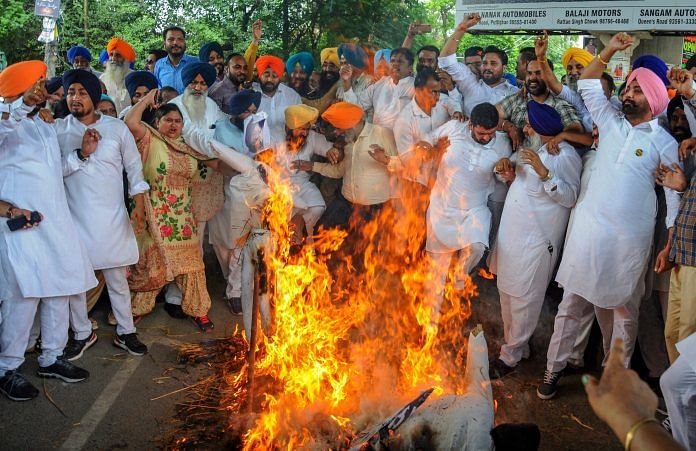The party refused to take part in a special assembly session on the 2015 desecration issue, allowing its opponents a free run.
Chandigarh: A-year-and-a-half after suffering a humiliating electoral defeat at the hands of the Congress in Punjab, the Shiromani Akali Dal (SAD) is now faced with the prospect of virtually losing its core constituency — the Panthic Sikh vote-bank.
Over the last week, SAD has been at the receiving end of the politicking over the desecration incidents that rocked the state in 2015, when the party was in power.
The party appeared to have taken in its stride the first controversy that was sparked by the Justice Ranjit Singh (retd) Commission report tabled in the Assembly last week.
The report had indicted then chief minister and SAD patron Parkash Singh Badal for the police firing near Kotkapura city that left two Sikh protesters dead. The two were part of a larger group of protesters who were agitating against the desecration of the Guru Granth Sahib in October 2015.
In two press conferences, SAD chief Sukhbir Singh Badal had launched a scathing attack on Justice Ranjit Singh himself, accusing him of personal and political bias and manipulation of evidence. He had almost turned the tables on the ruling Congress, which in 2017 had appointed the one-man commission to probe the desecration incidents.
Inexplicably, however, the SAD boycotted a special debate on the desecration issue in the Punjab assembly on 28 August, allowing its opponents — both factions of the Aam Admi Party (AAP) and the ruling Congress — to launch a sustained attack against it.
Also read: There’s a cloud hanging over the Badals, and this report is the reason why
On 1 September, AAP MLA and senior advocate, Harinder Singh Phoolka, threatened to resign from his seat in the Punjab assembly if a criminal case was not registered within a fortnight against Parkash Badal and his son and former deputy chief minister Sukhbir Badal over the issue.
Phoolka has also demanded the resignation of the five Congress ministers who led the charge against the Badals over the sacrilege incidents in the recently concluded three-day assembly session in case the government fails to act.
Although the five ministers issued a joint statement the next day saying Phoolka’s “ultimatum” was against the basic tenets of equity and justice, Chief Minister Captain Amarinder Singh Tuesday “vowed to go hammer and tongs” after Parkash Badal and “fix him”.
A costly boycott
The SAD has only itself to blame for the situation.
After its attack on the Justice Ranjit Singh Commission report, the SAD leadership betrayed a sudden loss of moral confidence by boycotting the special debate on the desecration issue in the assembly.
The field was left open to the ruling Congress to address all sections of Sikh as the Akalis risked serious erosion of their hold over the Panthic flock.
The seven-hour-long discussion in the assembly on 28 August saw a remarkable switching of roles in Punjab’s politico-religious arena. Donning the Panthic mantle — hitherto the exclusive preserve of the Akalis and the Sikh extremists — speaker after speaker from the Congress benches, including five senior cabinet ministers, empathised with the widespread Sikh sentiment of anger and anguish over the desecration of the Guru Granth Sahib.
With the proceedings and speeches relayed live across the world, the treasury benches made emotionally surcharged speeches, traditionally employed by the Akalis, while appropriating all the flaming metaphors of Sikh devotion.
The non-Congress benches in the assembly, principally the two factions of the AAP, fully endorsed the Congress speakers. Both Sukhpal Khaira and Kanwar Sandhu, on the one hand, and the officially designated leader of the opposition Harpal Cheema as well as Phoolka and Baljinder Kaur, on the other, gave their support to the treasury benches virtually on all critical issues.
Also read: Amarinder Singh’s sacrilege bill shows no Indian political party will fight for free speech
An opportunity lost, grave rumblings within
Only a day earlier, on 27 August, the Akalis led by Sukhbir Badal had cornered the Congress in the assembly over Rahul Gandhi’s “clean chit” to his party for the 1984 anti-Sikh riots. On the defensive, CM Amarinder Singh then named four Delhi Congress leaders as being responsible for the riots while absolving the party as a whole.
The next day’s boycott of the desecration debate was not only unexpected but was a complete U-turn in the Akali approach. Having promised a strenuously competitive match, SAD virtually fled when the game began.
Since then, grave rumblings have surfaced within the SAD over the boycott.
Former senior cabinet minister Tota Singh and former SGPC chief Avtar Singh Makkar have publicly assailed the decision. SAD’s ally in the state, the BJP, too has questioned the wisdom behind the boycott. Former president of the party in Punjab, Kamal Sharma, Monday said the Congress and the AAP had “taken full advantage of the boycott”.
Also read: Amarinder Singh govt’s sacrilege bill has history, will be open to misuse
On Tuesday, SAD leader Malkit Singh Birmi resigned from the primary membership of SAD over the issue. A former Congressman, he had joined the Akali Dal ahead of the 2014 parliamentary polls.
Breaking his silence over the issue, Parkash Badal is now at pains to explain that he did not order the police firing on Sikh protesters. His party, which had held state-wide protests Saturday against the “injustice” of the report, has now planned two rallies at Abohar and Faridkot to try and salvage its position in the coming days.
However, SAD’s strategic boycott is a decision, rather a blunder, which the party will rue for long.



